Golden aspen groves, misty mountains, weather that changes in a split second… Spending 2 days in Rocky Mountain National Park, Colorado, in mid- and late fall can be a beautiful, engrossing, and certainly unpredictable adventure.
Last updated: April 7, 2025
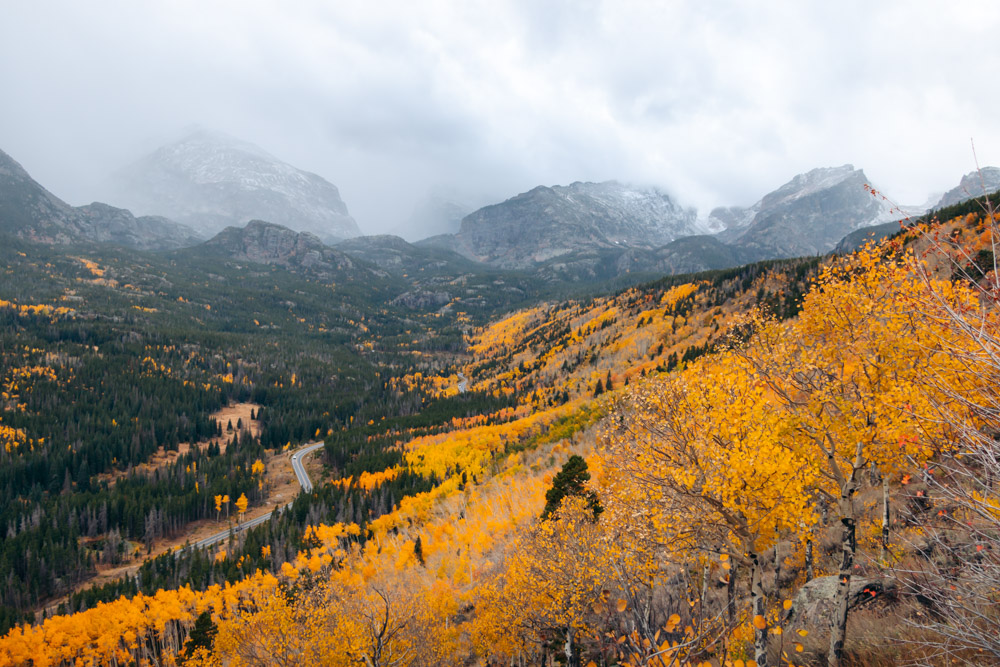
2 Days in Rocky Mountain National Park in Fall (October – November) Itinerary
I was secretly wishing for veils of bright fall colors enveloping sweeping hills and mountain sides while planning our 2-day trip to Rocky Mountain National Park in mid-fall. The fall foliage is short-lived, especially at high altitudes where snow can claim its territory as early as mid-October.
But even if there is no fall brilliance left, Rocky Mountain National Park promises astonishing views of its scenic alpine lake and prominent peaks. Getting lost in thick fog, the Rockies turn into a dreamy, mysterious place at this time of the year.
On the other hand, spending 2 days in Rocky Mountain National Park in fall has its own peculiarities. Two of the popular routes, Trail Ridge Road and Old Fall River Road, cease to reveal their natural wonders until warmer days.
While the latter welcomes visitors mostly during the summer season, the former likes to tease the Rockies’ guests. It showers the adventurers with bright, not necessary warm, sunrays one day. The very next one, it turns into a naughty host, raging with rain, snow, and hail. Once the area starts throwing tantrums, access to it is denied.
Considering all these, planning the 2 Days in Rocky Mountain National Park in Fall (October – November) itinerary can be daunting. Alternative plans are almost always required. The rewards, however, outweigh your effort and time you spend to research any additional trails and road conditions.
With that said, if the cold and quite unpredictable weather don’t scare you, spending a few days in Rocky Mountain National Park in fall is absolutely worth it. But first, let’s see what makes this area so alluring.
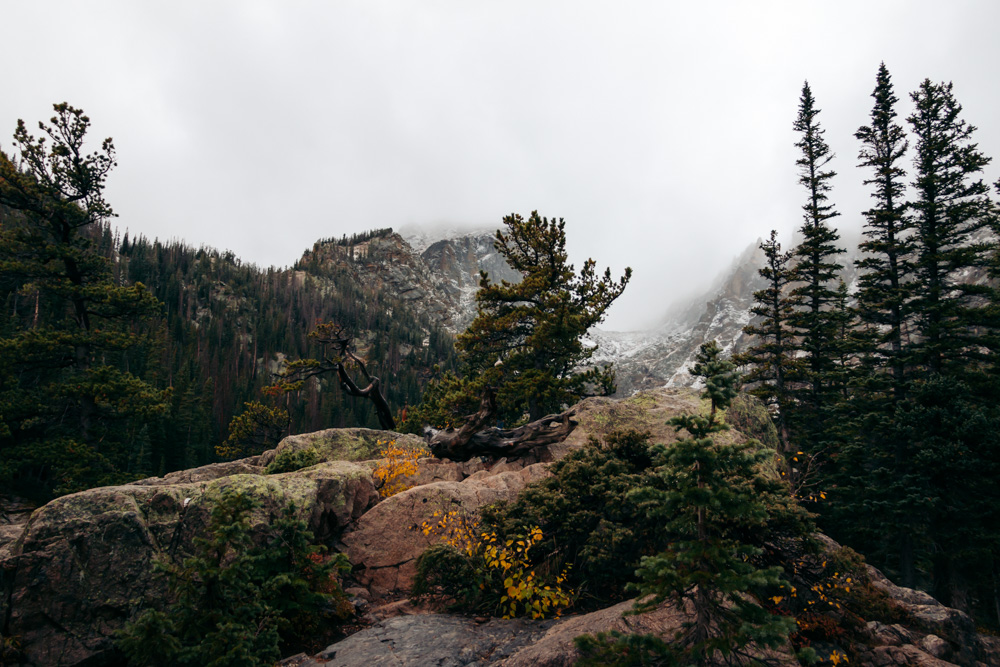
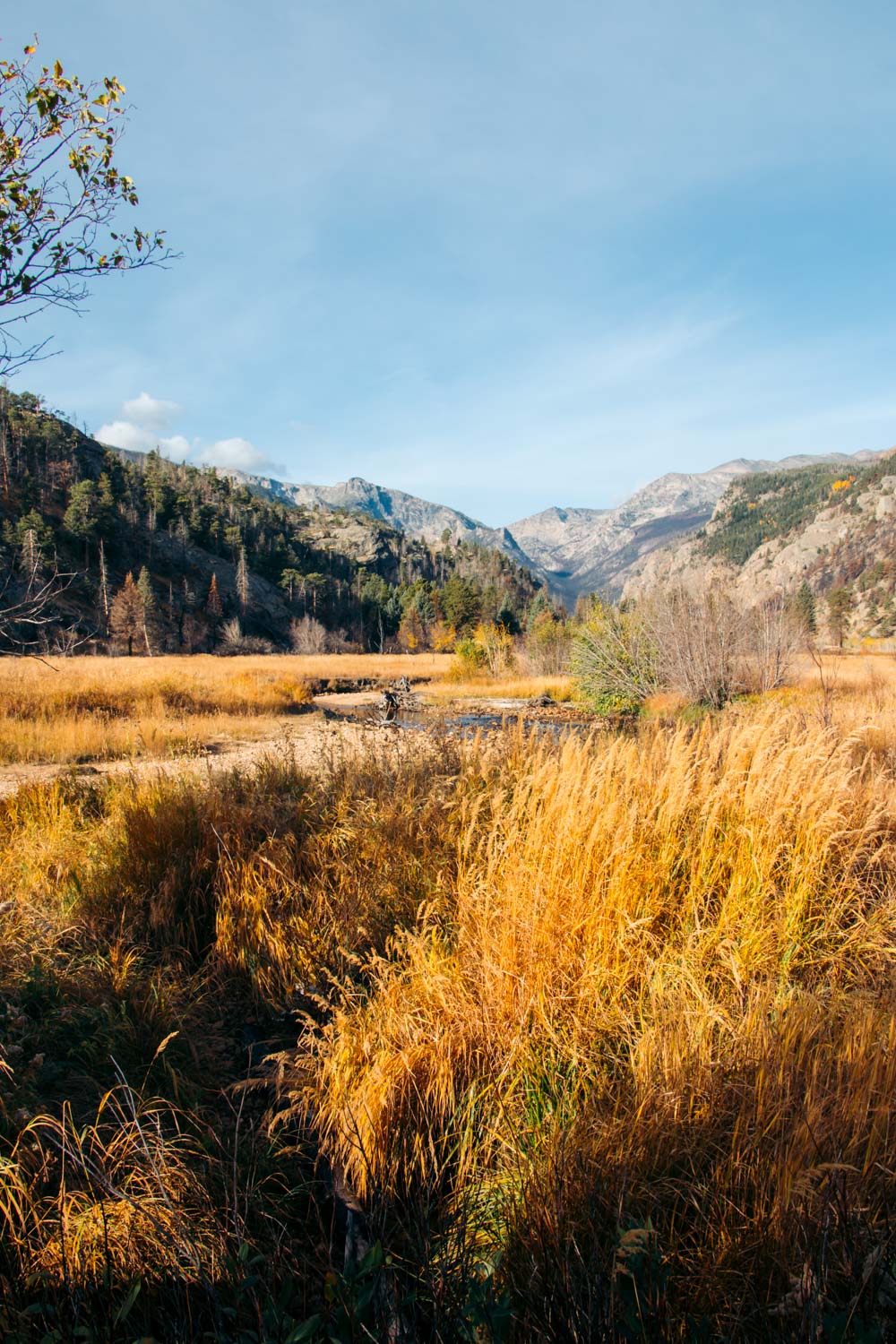
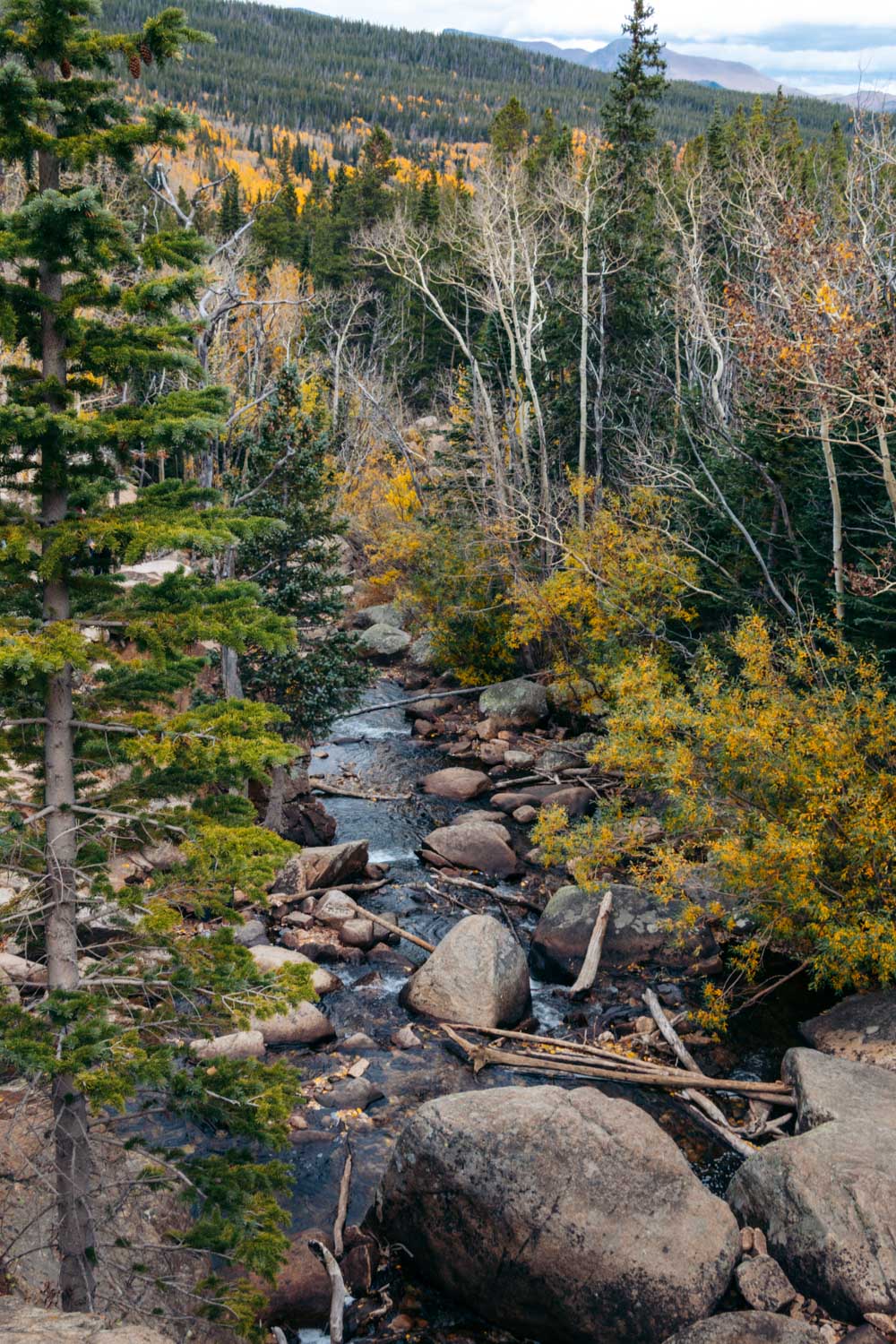
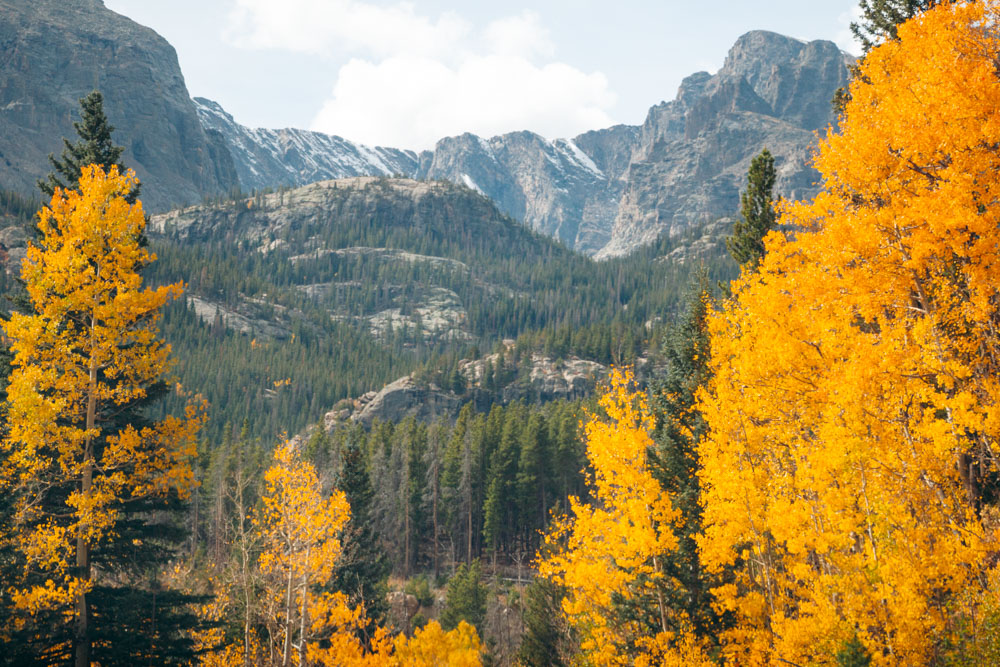
A Word about Rocky Mountain National Park
One of the highest national parks in the USA, Rocky Mountain National Park, Colorado, was established on January 26, 1915. The 415-square-mile region gained the nation’s attention from its early days. Packed with a profusion of subalpine and alpine lakes, majestic peaks, sporadic waterfalls, and rich wildlife, the Colorado Rockies is an excellent outdoor adventurer’s playground.
Nearly 300 miles of hiking trails intersect Rocky Mountain National Park, offering enough reasons to spend a couple of days in the area in fall, summer, spring, and winter.
But the mountains are what sets the area apart. Home to more than 100 peaks that rise above 11,000 feet in altitude, the national park is the epitome of a mountain-reigned country. Many of these giants conjoin to form a part of the Continental Divide.
Not surprisingly, in 1976, UNESCO recognized Rocky Mountain National Park as one the first MAB Biosphere Reserves. Considering all these, along with ample opportunities to encounter elk, moose, and deer in fall, spending a few days exploring Rocky Mountain National Park is an adventure one can only wish for.
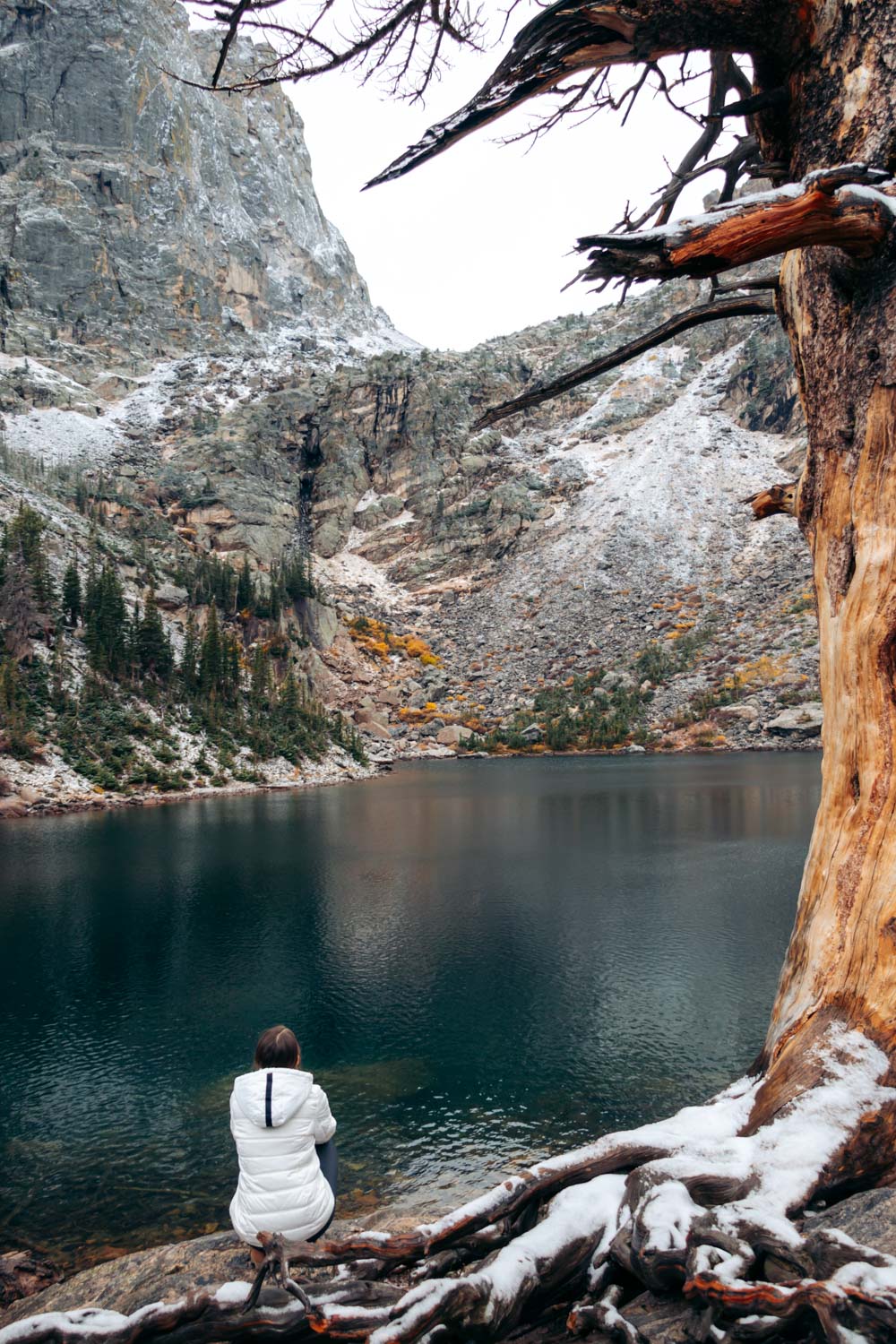
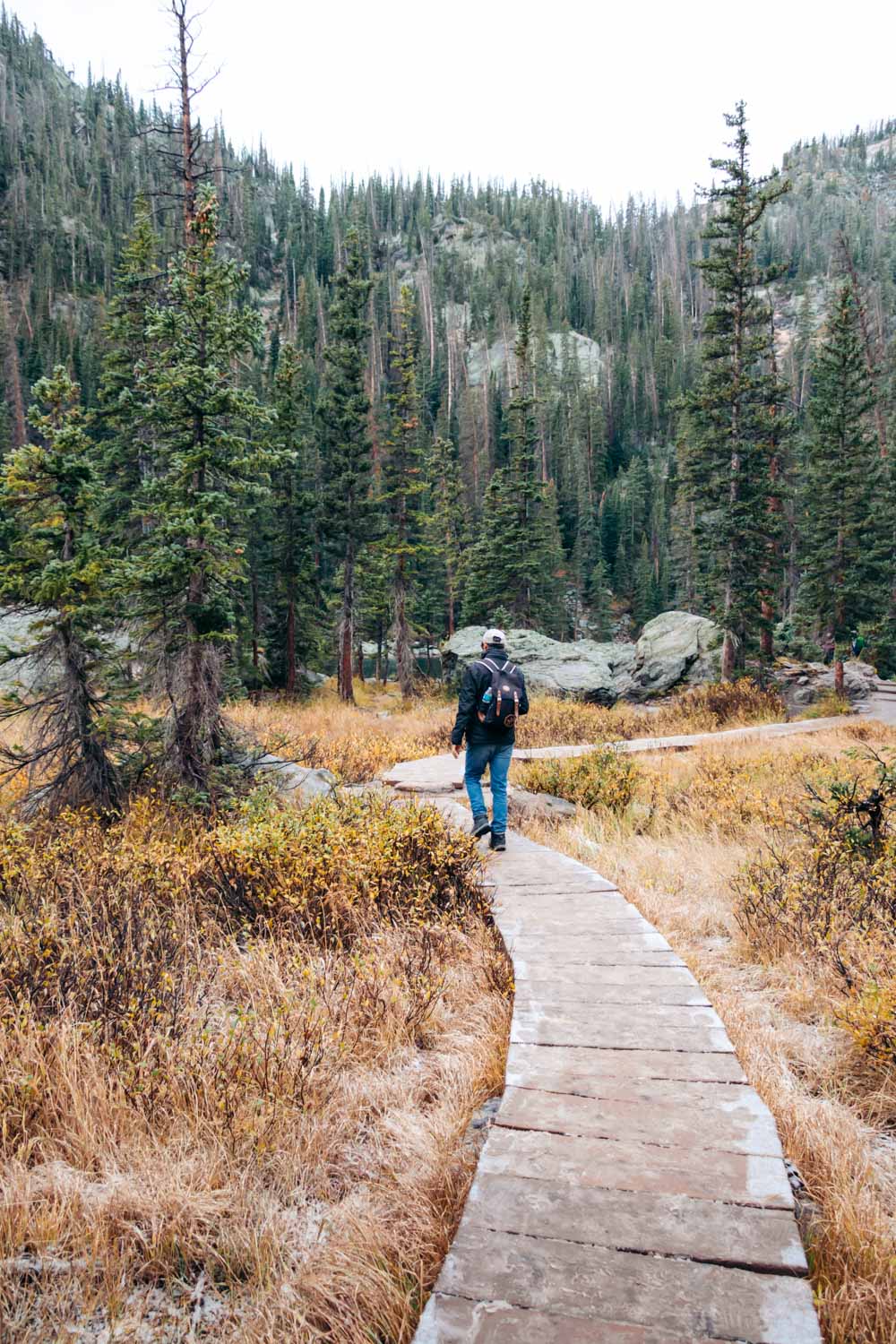
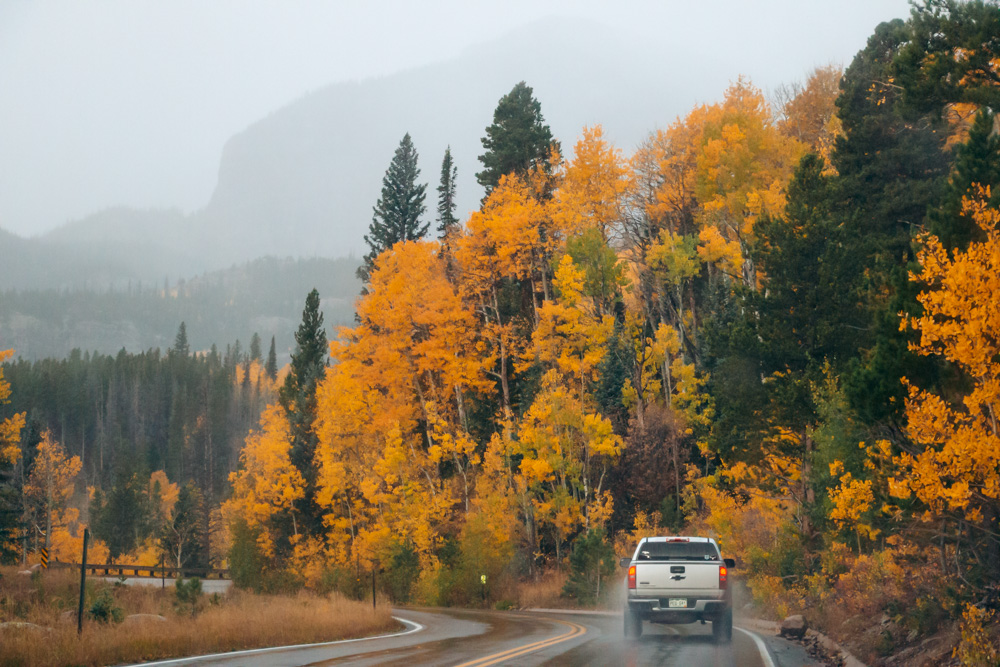
Why Spending 2 Days in Rocky Mountain in Fall Is Incomparable to Other Seasons
As we mentioned before, the unpredictability is the first issue you face when planning to spend a few days in Rocky Mountain National Park in fall. While September still reaps most of the benefits of the summer season, October and November face several insurmountable challenges.
The temperamental weather is one of them. The sun can shine brightly in the morning, just to give in to the afternoon rain and heavy snowfall in the evening. These sudden changes certainly don’t do a favor neither to the wildlife roaming in the park, nor to the human visitors.
For the latter, it may mean missing out on some of the most coveted trails and alpine landscapes. Simply because as they say in the park, you don’t want to be up in the mountains when the roads are icy. With that said, the 2-day fall adventures in Rocky Mountain National Park ask for additional planning and multiple alternative activities.
HOW TO SPEND 2 DAYS IN ROCKY MOUNTAIN NATIONAL PARK IN FALL (OCTOBER – NOVEMBER)
If you’re still determined to enjoy the misty surroundings of Rocky Mountain National Park in fall, let’s see what you can do in this elevated wilderness in 2 days.
ROCKY MOUNTAIN NATIONAL PARK IN FALL: DAY 1
Daily hiking distance: 8-9 miles
Stop 1: Cub Lake, Moraine Park
Start your 2-day fall adventures in Rocky Mountain National Park with tramping along some of the off-the-beaten-path trails in Moraine Park. This area ends up on your itinerary for a reason. A primary destination for elk during their breeding season, it enhances your fall visit to Rocky Mountain National Park with a myriad of opportunities to watch these wild animals in their natural habitat.
You may even share a trail with one of these antlered animals. We did just that. After feasting our eyes on a gang of elk right by the side of Moraine Park Road, we headed deeper into the woods. The first destination of the day was Cub Lake, favored by humans and elk alike.
The subalpine lake sits at the end of a 2.4-mile trail. The dirt path crosses a narrow footbridge over the Big Thompson River almost at the trailhead. Then it runs along the edge of a wide meadow. Approximately 0.4 mile into the hike, the trail swirls to the right and continues on toward an aspen grove.
Although the most beautiful part of the hike, especially in fall, this section brings on the first serious challenges you’re yet to encounter during your 2-day adventures in Rocky Mountain National Park. Here, the trail sprints uphill, making the hike difficult for the first time.
As you persevere through this section, the path slowly levels out. Cub Lake is a 2-3-minute walk from here. Take the same route to get back to the trailhead.
Alternative Activity: If you have time and the weather favors, turn your Cub Lake hike into a loop, adding another 1.4 miles to the journey. Alternately, hike to Fern Lake, another must-see alpine lake accessed from the Moraine Park area.
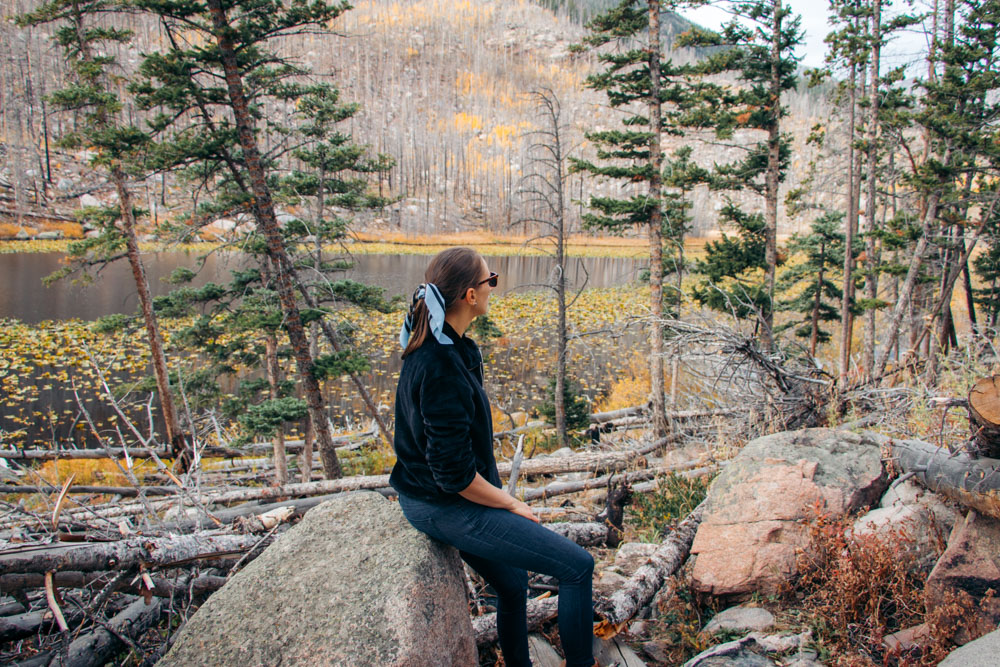
Stop 2: Bear Lake Loop
From Moraine Park, head to the Bear Lake area, located at the end of Bear Lake Road. Bear Lake is the most popular subalpine lake to explore during a 2-day journey to Rocky Mountain National Park in fall.
The loop is short, only 0.6 mile. The trail around the lake is mostly paved, flat, and wheelchair accessible. Dotted with a myriad of small benches, it’s an easy walk for people of all physical activity levels. The highlights of the Bear Lake Loop are panoramic views of Hallett Peak and Longs Peak, guarding the lake from a distance.
Stop 3: Alberta Falls
Once you make it to the Bear Lake Trailhead, make the most of this area. Whether you have one or two days to spend in this part of Rocky Mountain National Park in fall, a profusion of memorable experiences are guaranteed.
When you complete the walk around Bear Lake, head back to the area behind Bear Lake ranger station. Here, at a trail junction, veer to the left and tread to Alberta Falls.
The 2-mile, round-trip trail is easy. A noticeable change in elevation is present only near the trailhead. While a gradual descent at the start spares your energy for other hikes you plan for these 2 fall days in the mountains, this section becomes the most tedious on your way back to the trailhead.
The 30-foot waterfall, however, is rather shy. Hiding at the feet of large rock slabs, it gives off a dreamy vibe to the forested surroundings.
What to Know: Another aspen grove festoons the hike in late September – early October, proving once again that fall is one of the best times to visit Rocky Mountain.
READ MORE: 9 Hikes in Rocky Mountain National Park: Under 3 Miles
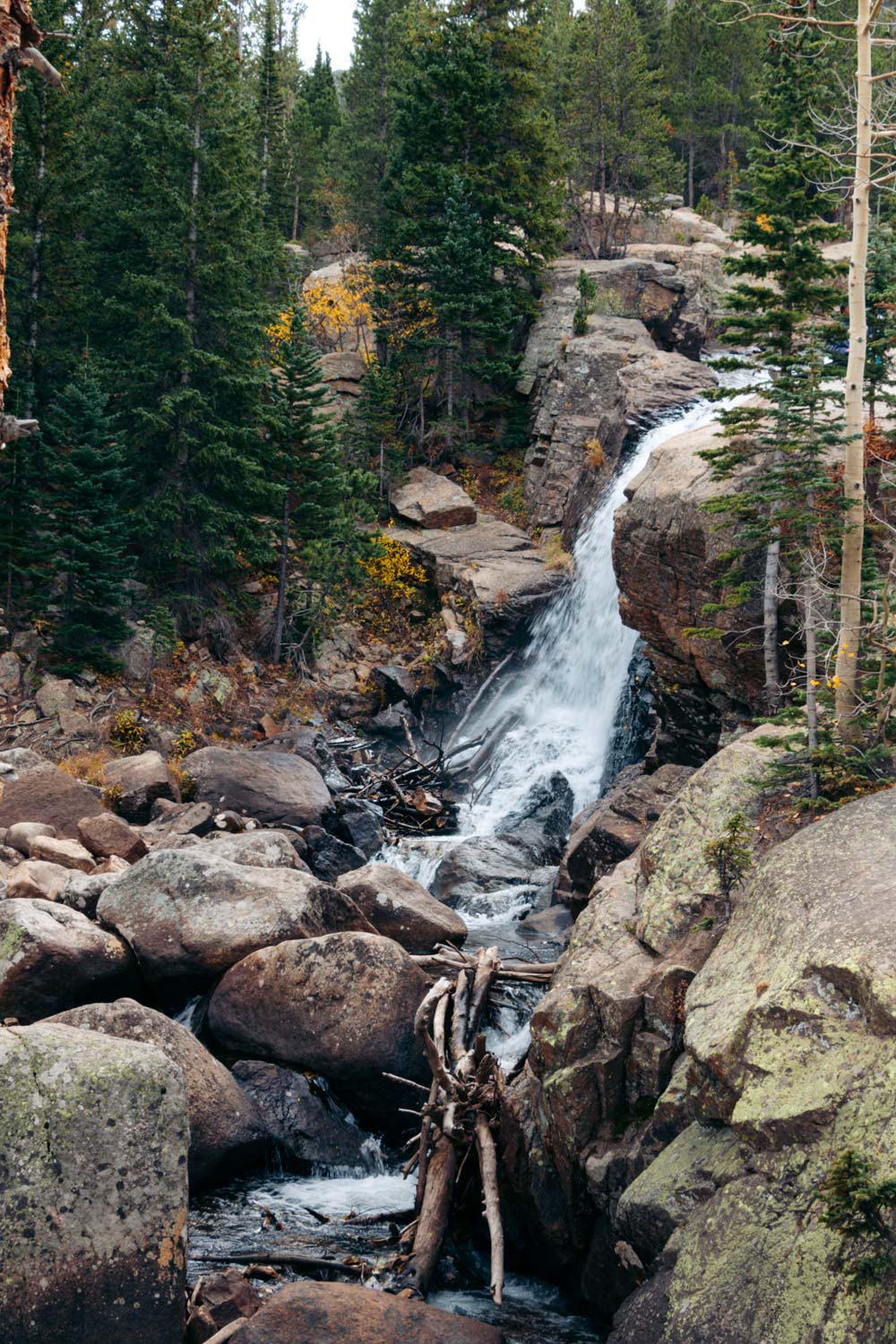
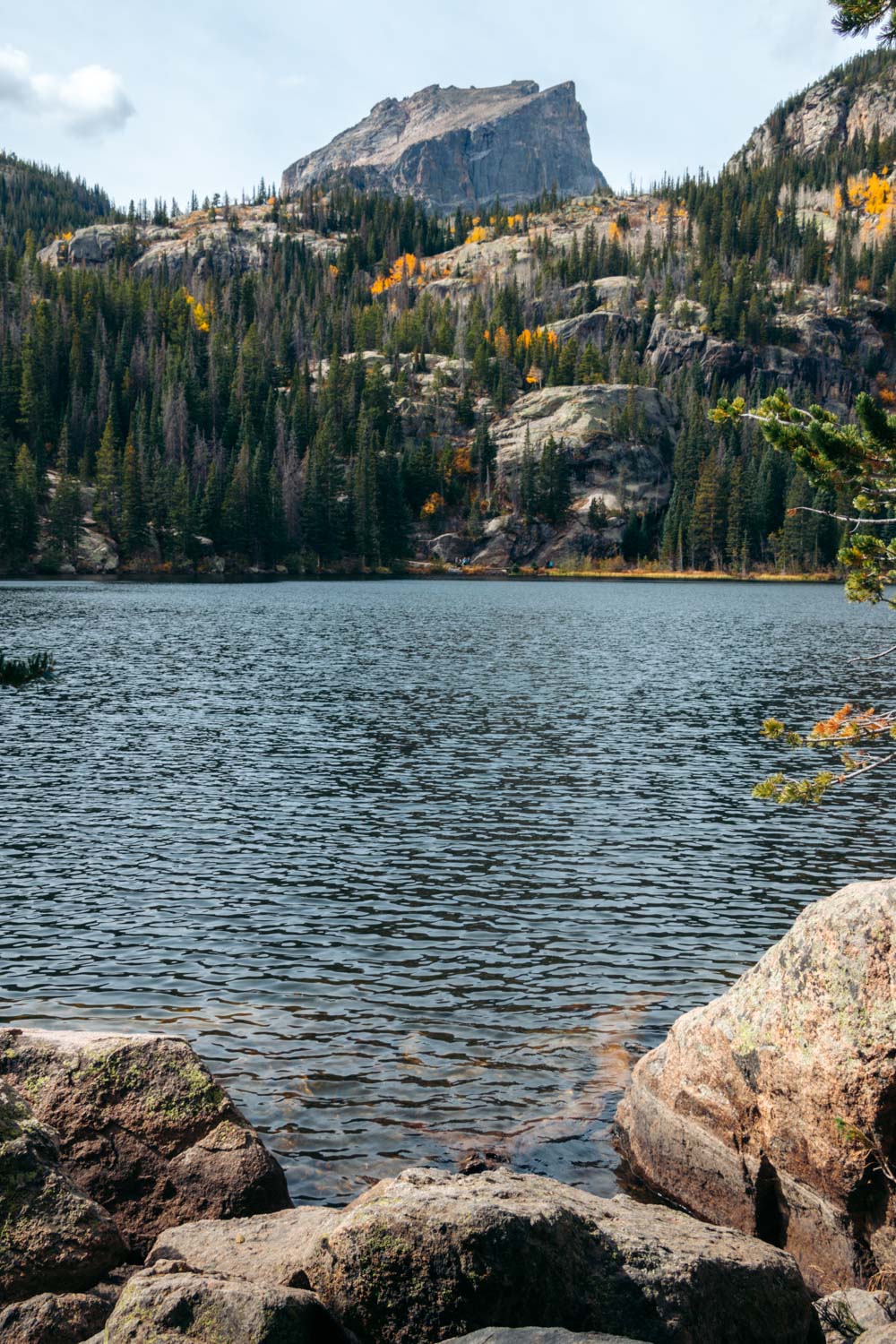
Stop 4: Trail Ridge Road, Flattop Mountain, or Estes Park
Your itinerary for the rest of the day may differ, depending on the weather and precise time you plan to visit Rocky Mountain.
For those who venture to the region in early October, spend the rest of the day admiring alpine tundra intersected by Trail Ridge Road. One of the highest paved roads in the country, the scenic drive remains open until the first weekend of the month. These dates, however, vary depending on the weather. Some of the things not to miss in the area are the Tundra Communities Trail, Forest Canyon Overlook, and Alpine Ridge Trail.
If you go on a 2-day adventure in Rocky Mountain National Park at a later time in fall, consider hiking to Flattop Mountain or spending the afternoon in Estes Park. The former is a long, 8.8-mile, round-trip hike. Its trailhead is located in the Bear Lake area.
For those fall travelers who prefer to spare some energy for the second part of their 2-day trip to Rocky Mountain National Park, give some rest to your tired (no doubt about it) feet in downtown Estes Park. Here, you can pick some gifts to take home and spend an evening indulging in local cuisine.
TIP: The gateway city to Rocky Mountain National Park, Estes Park however, is not among the most affordable towns in Colorado. So if you prefer to stay on a budget, just return to your home away from home after the first part of your fall adventures in the national park and cook your own dinner.
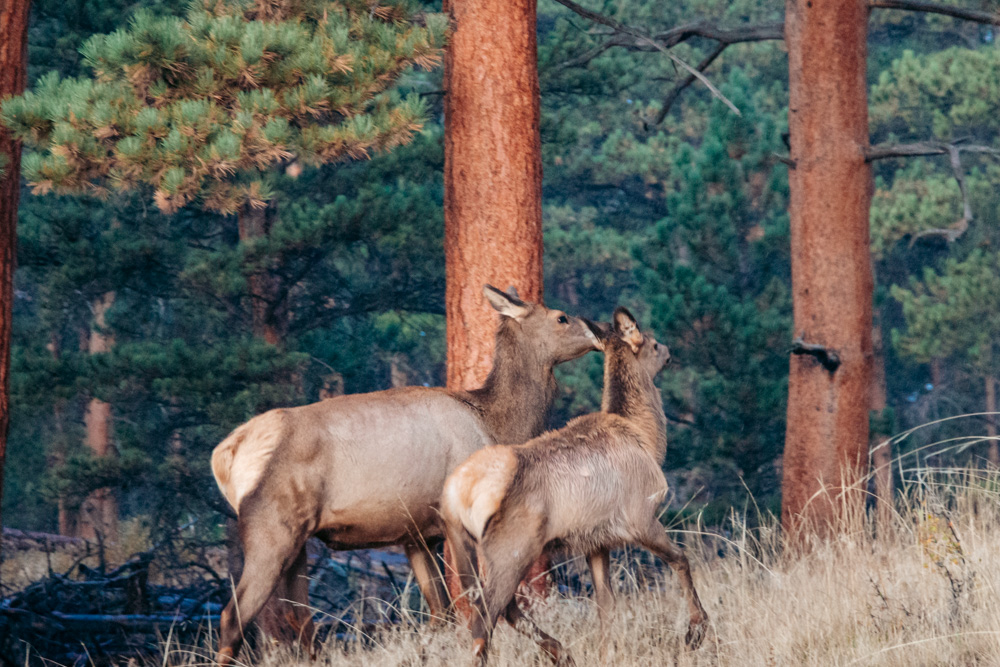
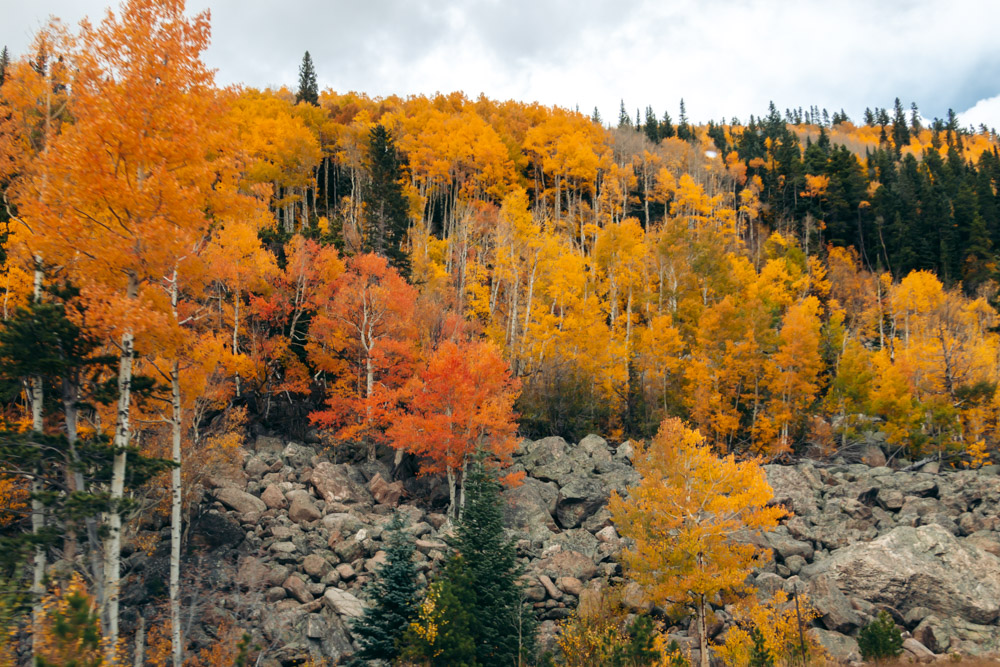
ROCKY MOUNTAIN NATIONAL PARK IN FALL: DAY 2
Daily hiking distance: nearly 10 miles
Stop 1: Nymph, Dream, and Emerald Lakes
The Nymph, Dream, Emerald Lakes hike is one of the favorite routes in the Bear Lake area. A path that starts behind the Bear Lake ranger station runs uphill, taking its guests to 3 scenic alpine lakes.
The trail can be broken into a few separate trips. Beginner hikers may want to return to the trailhead after walking around Nymph Lake. Those who persevere, enhance the short fall trip to Rocky Mountain National Park with festive autumnal colors or snowy tracks on top of the exceptional views of dreamy lake and misty mountains.
The entire hike is 3.6 miles long. While the trail is fairly easy to walk along at the beginning, it gets steeper at the end.
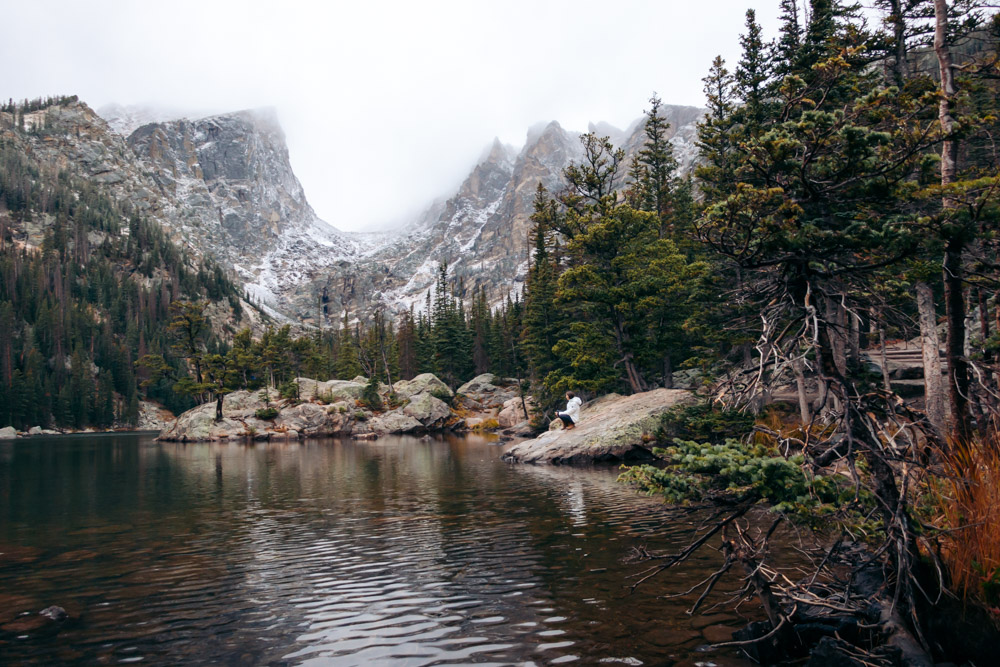
Stop 2: Lake Haiyaha
If you’ve packed your 2 days in Rocky Mountain National Park with the fall-adorned views of all three lakes mentioned above, don’t rush to get back to the trailhead yet. Instead, aim at exploring rugged shores of Lake Haiyaha.
The trail to another stunning alpine lake in the Bear Lake area veers to the right at a Nymph Lake trail junction. From here, it’s a steady walk uphill for approximately 0.5 mile along a cliff edge overlooking the Glacier Basin area.
Slowly, the trail dives into the woods. In another 0.5 mile or so, it stops at the rocky shore of Lake Haiyaha. The less popular lake is a sheer delight in fall when thick fog cloaks the towering peaks in the distance.
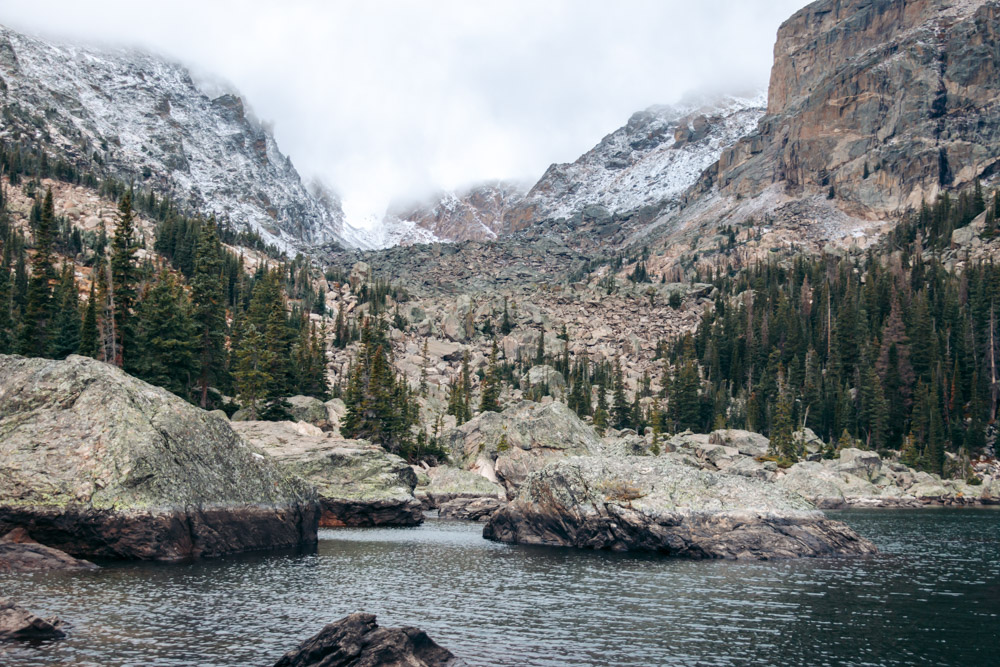
Stop 3: Bierstadt Lake
You have one more big fall hike left to finish your 2 days in Rocky Mountain National Park strong. Similar to the lakes you saw earlier, Bierstadt Lake is nestled in the woods. Surrounded by mostly evergreen trees and the distant mountains with fog lingering at their tops, the place is a true embodiment of a fall hike.
The ways to get to the lake, however, differ. You can start your hike at the Bear Lake Trailhead and tramp through the woods until the wide shores of the lake allure you.
If you long for the most unforgettable fall adventure while spending a few days in the woods of Rocky Mountain National Park, stick to the Bierstadt Lake Trailhead. To do so, you need to drive back along the winding Bear Lake Road and pull over in a small parking lot at the trailhead.
The second trail is slightly shorter, approximately a 3-mile, round-trip hike. The pop of fall color adorning the path that runs up a mountainside is what you can’t miss in Rocky Mountain National Park in early and mid-October.
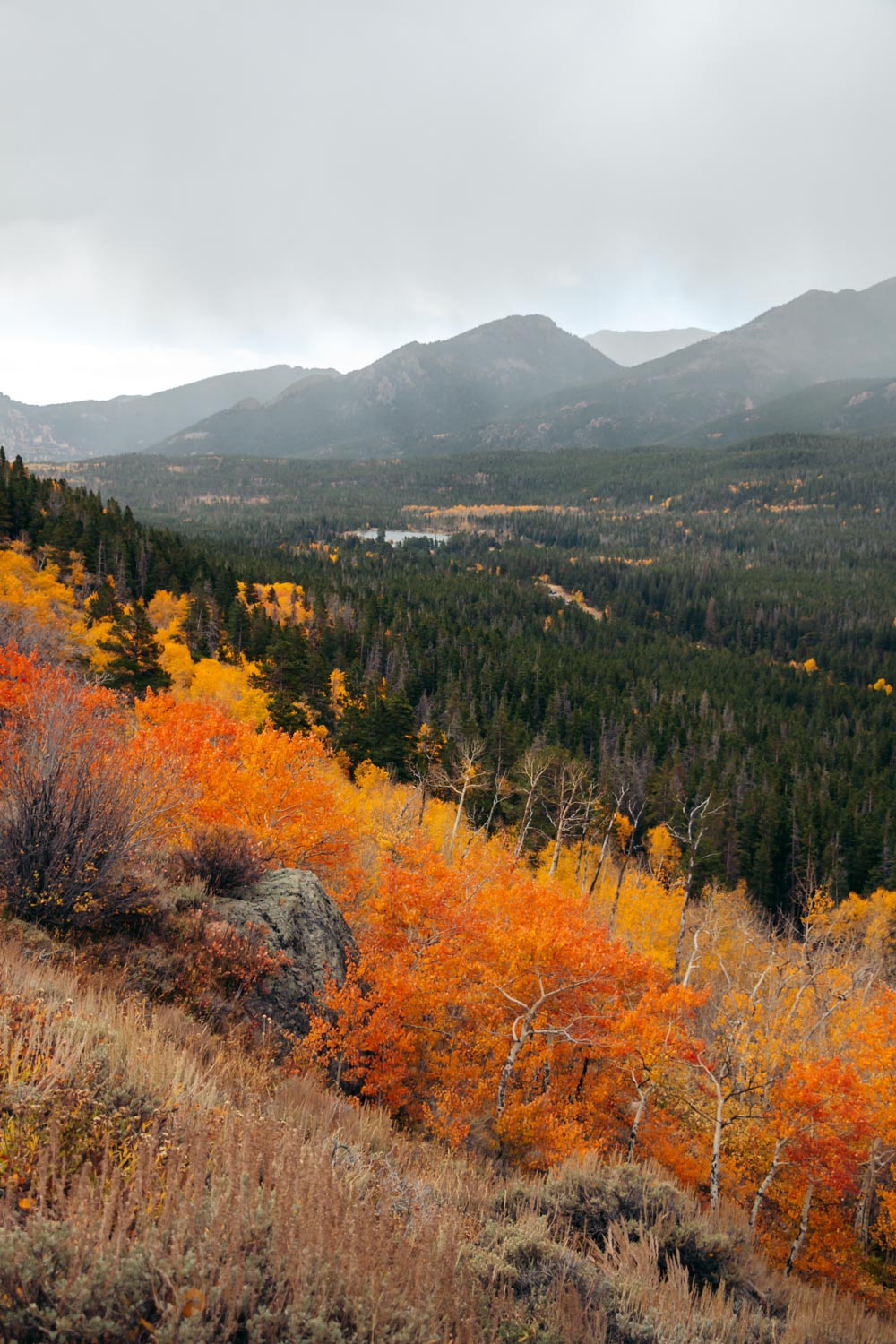
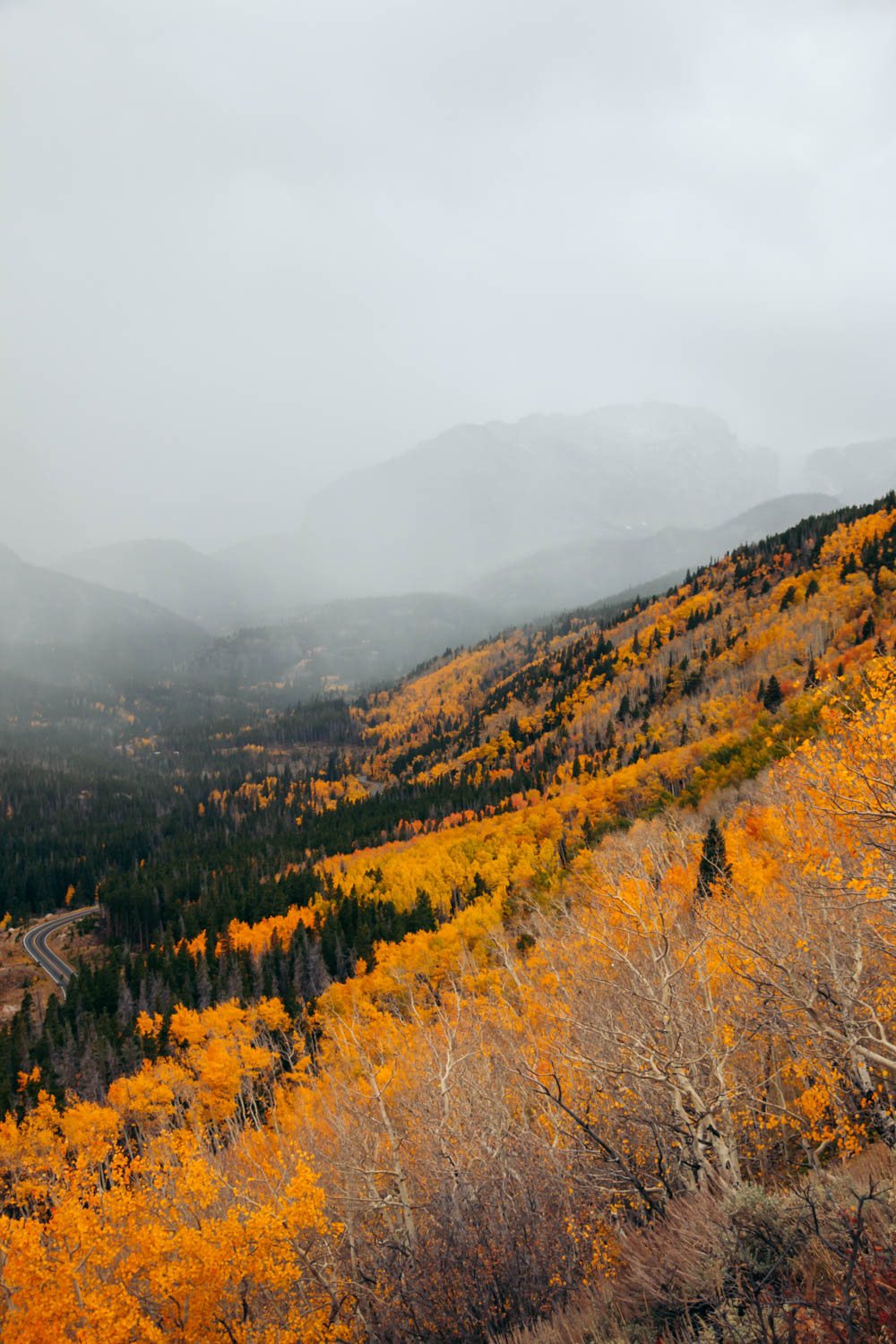
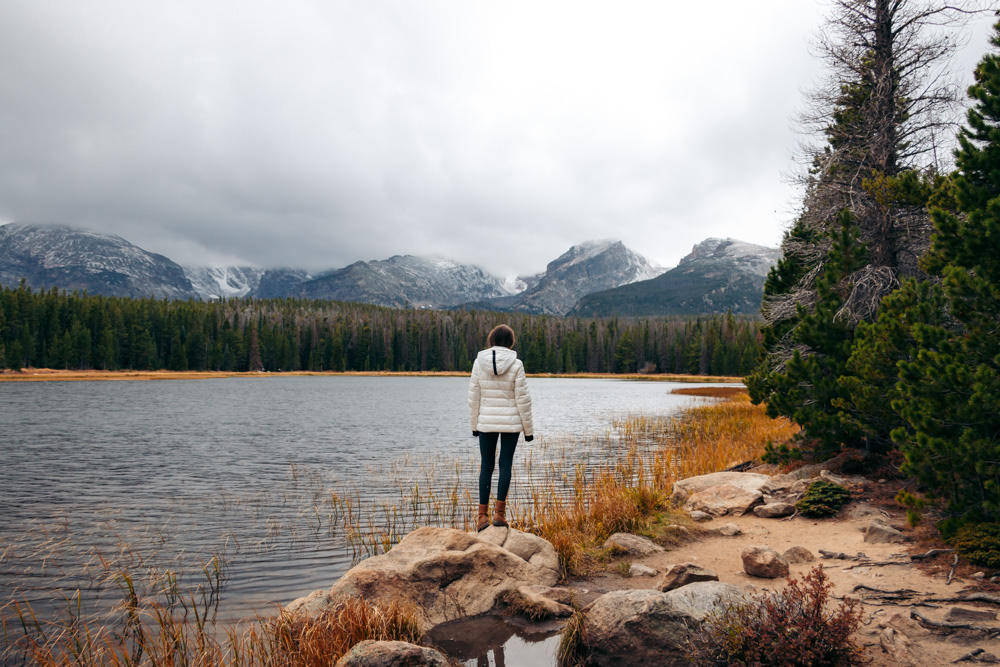
Stop 4: Sprague Lake Nature Trail
Finish your 2-days-in-Rocky-Mountain-National-Park-in-fall saga with the easy, 0.8-mile Sprague Lake Nature Trail. Adjacent to a parking lot, this lake can be quite busy, especially in the late afternoon. The views of the surrounding mountains, however, are worth dealing with some hustle and bustle of the popular areas of the park.
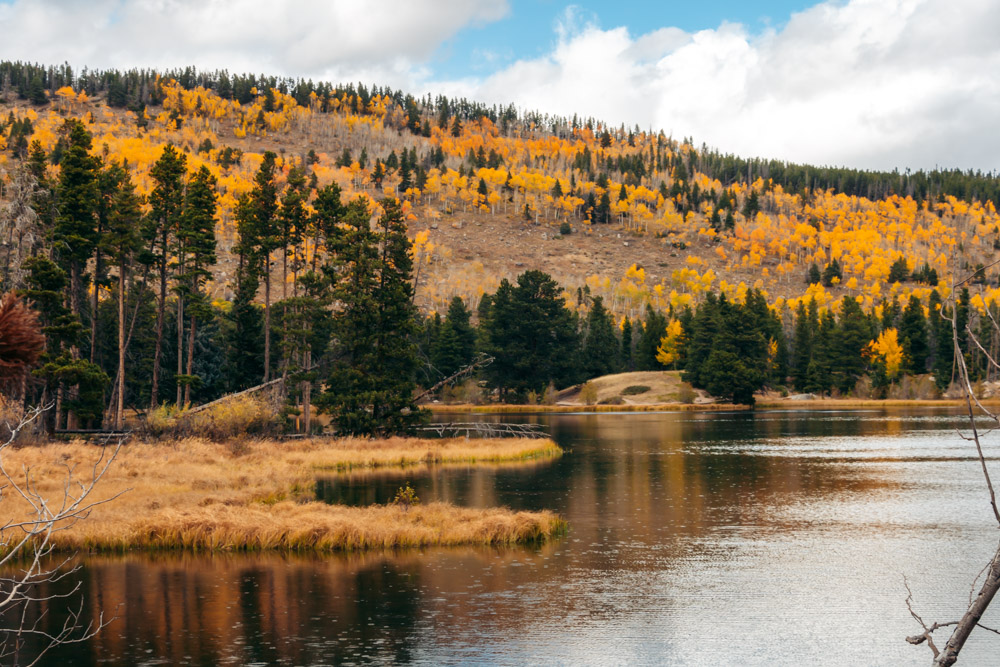
2 Days in Rocky Mountain National Park in Fall: Map
Things You Should Know Before Spending 2 Days in Rocky Mountain National Park in Fall
Frequent Weather Changes
The weather in the mountains is very unpredictable. In fall, it becomes one of the main orchestrators in Rocky Mountain National Park, forcing you to change your day activities at once.
Plan for Alternative Activities
Given the frequent weather’s mood swings, you should plan for several alternative hikes, drives, and sightseeings when spending 2 days in Rocky Mountain National Park in fall. It applies especially to those who have the Trail Ridge Road area on their radar.
In early October, the route can get closed at any moment. After the first week of the second fall month, the area turns into an untamed winter wonderland. Soon the route to the alpine tundra area closes until spring.
Don’t Overplan
Leave room for unexpected discoveries that you will encounter in abundance during your fall adventures in Rocky Mountain National Park. Furthermore, prepare for the frequent changes in the naughty weather, which is excellent at messing up with all the planning altogether.
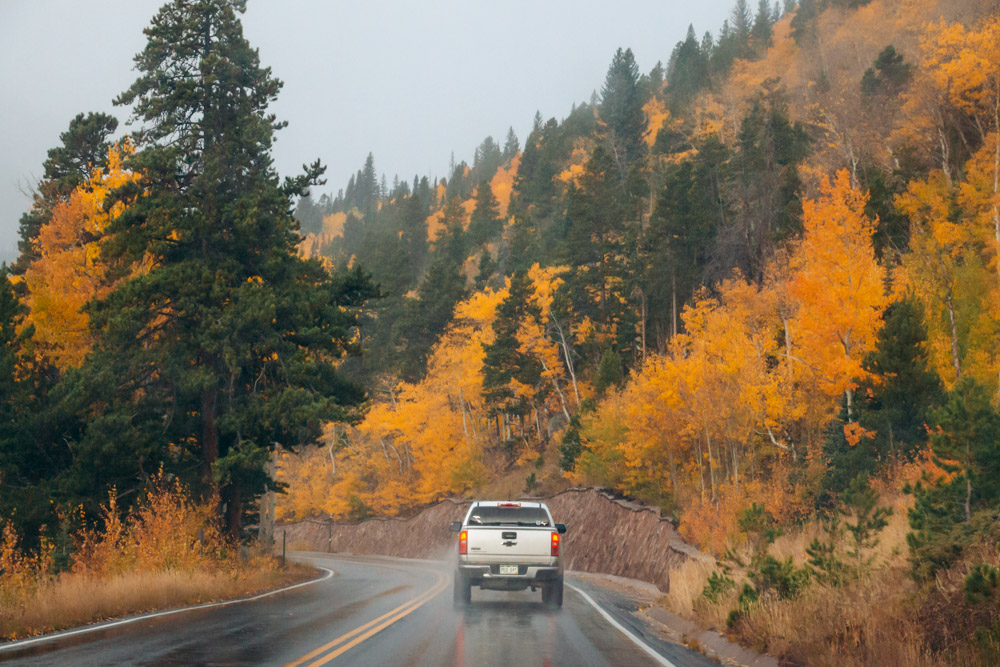
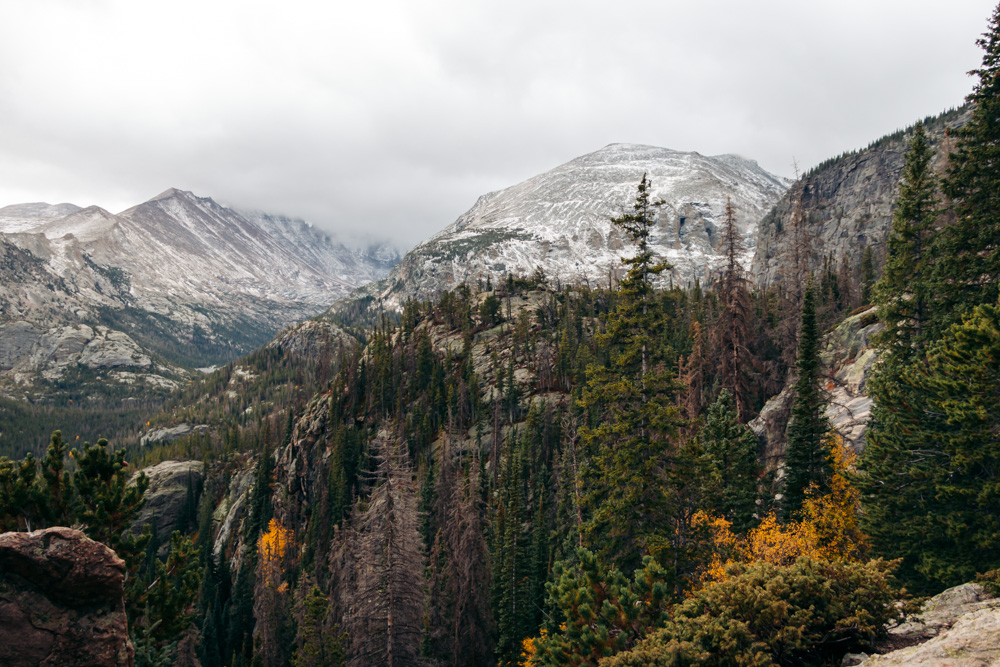
Don’t Forget about High Elevation
Don’t push through a steep hike. Instead, take frequent breaks. Better yet get acclimated to the altitude before venturing higher into the mountains.
Book a Room with Kitchenette
This tip doesn’t necessarily apply to only the fall trip to Rocky Mountain National Park. You can use it when spending some time in the area during any season. Yes, you may need to plan for extra time to cook for yourself and your travel companions. On the other hand, you will surely stay within your budget and dietary preferences.
Timed Entry Permit
As of the summer season of 2021, a timed entry permit and an admission pass are required to enter Rocky Mountain National Park from late May through mid-October. If you plan to spend a few days in Rocky Mountain National Park in late October or November, no timed entry permit is needed.
Check out for Road Closures
Fall and winter are the trickiest times to spend a few days in Rocky Mountain National Park. Seasonal road closures interfere with your plans, often leaving you without any idea what to do next. To avoid the unexpected surprises while in the park, check out for the current road conditions before you get here.
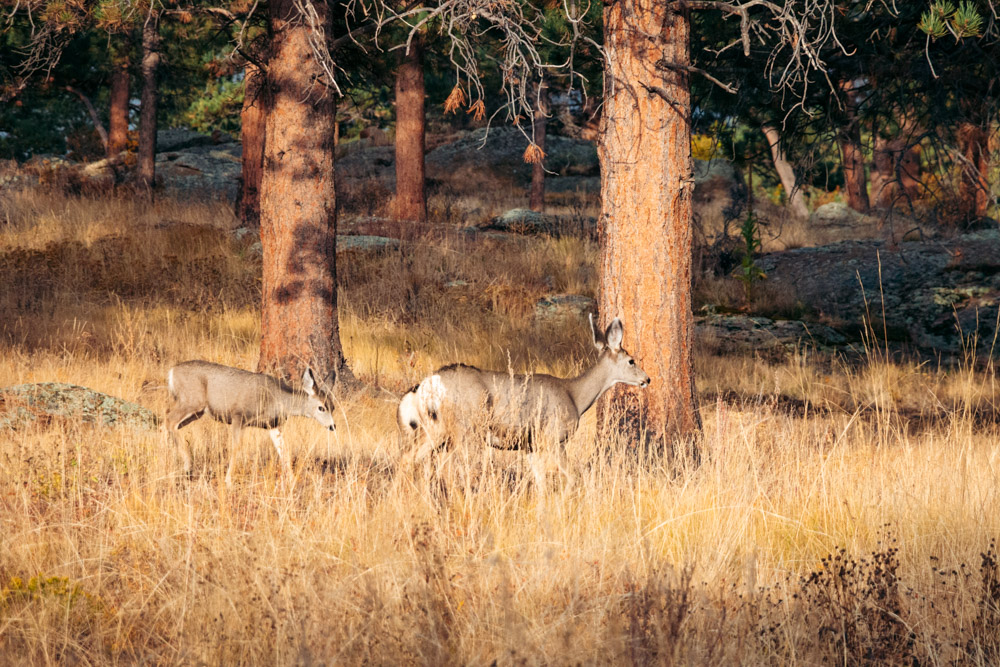
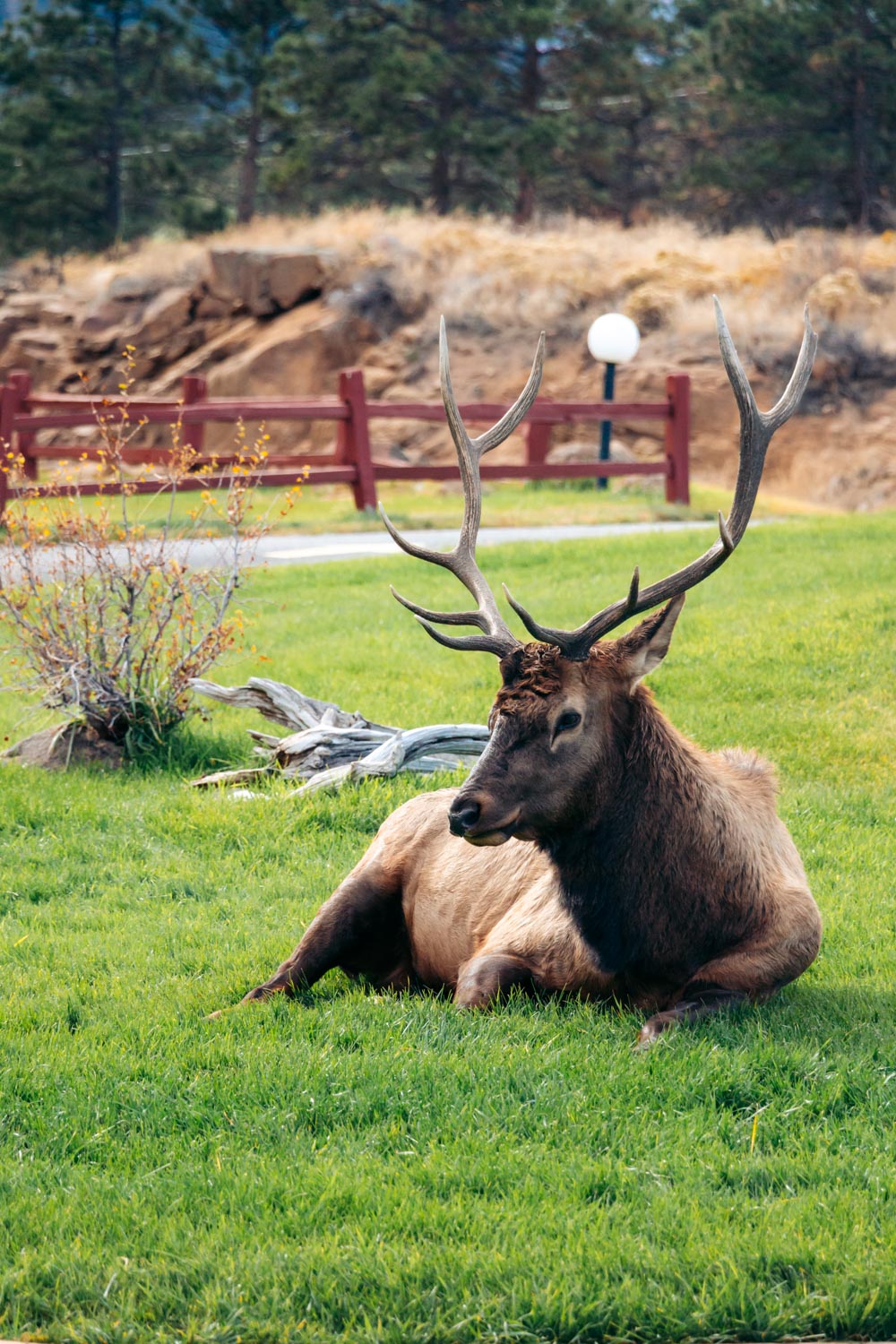
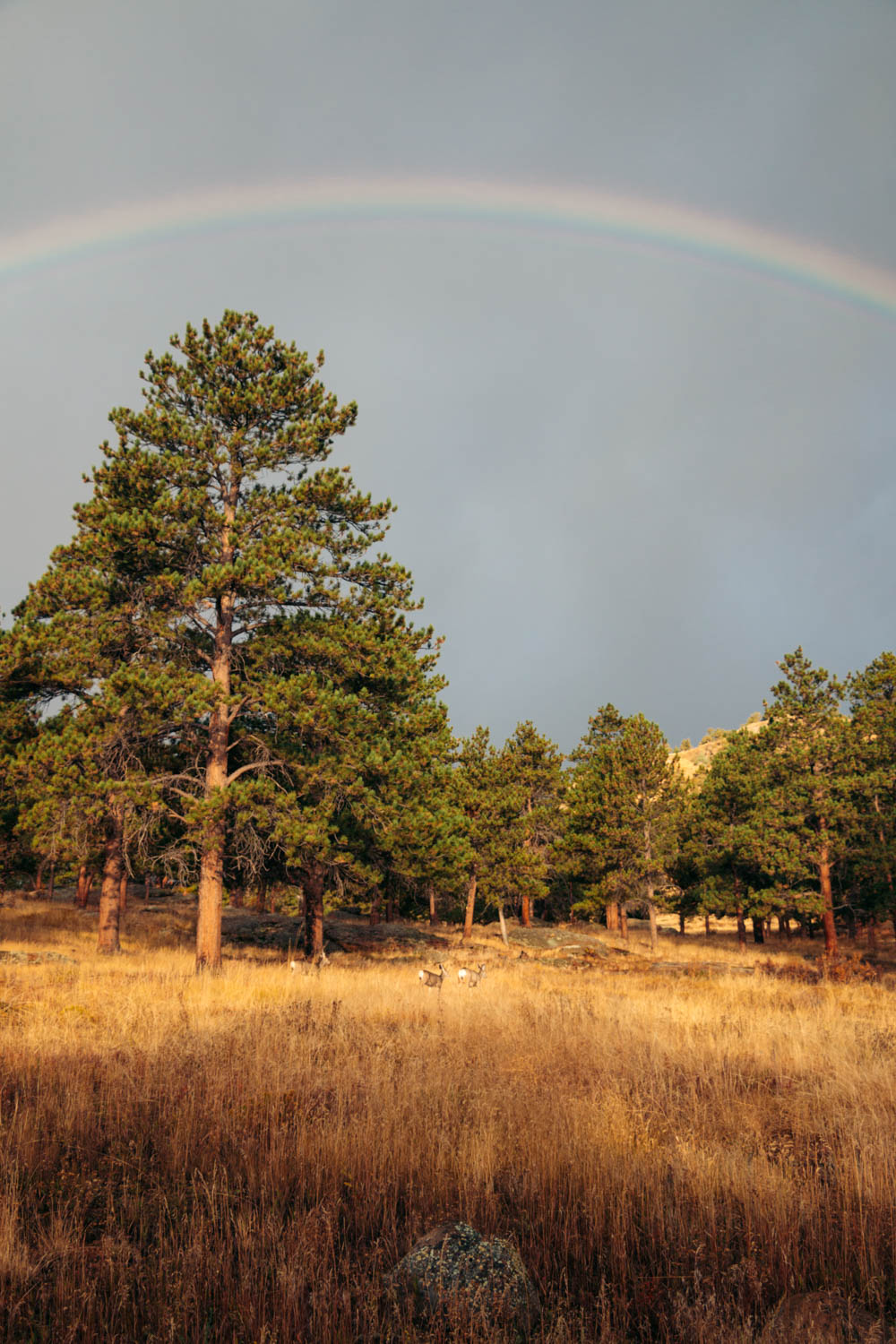
Where to Stay
Since some roads within the park get closed for the fall – winter season, it only makes sense to stay as close as possible to those areas that remain open throughout the year. Estes Park, a gateway to the park and the Bear Lake Road Corridor, is one of the places you want to consider.
We stayed at Brynwood on the River. The place is located just 2.6 miles from the Beaver Meadows Entrance. On top of that, it does offer rooms with tiny kitchenettes.
How to Get to Rocky Mountain National Park
Driving is always the best way to get to and around Rocky Mountain National Park. If you live in Colorado or any neighboring states, check how long it takes to get to the Rockies by car. In many cases, it’s the surest and most affordable option.
For those who live farther away, fly into Denver, located about 1 hour 30 minutes away. Rent a car at the airport and get ready for the unforgettable 2 days in Rocky Mountain National Park, full of the fall brilliance or snowy adventures.
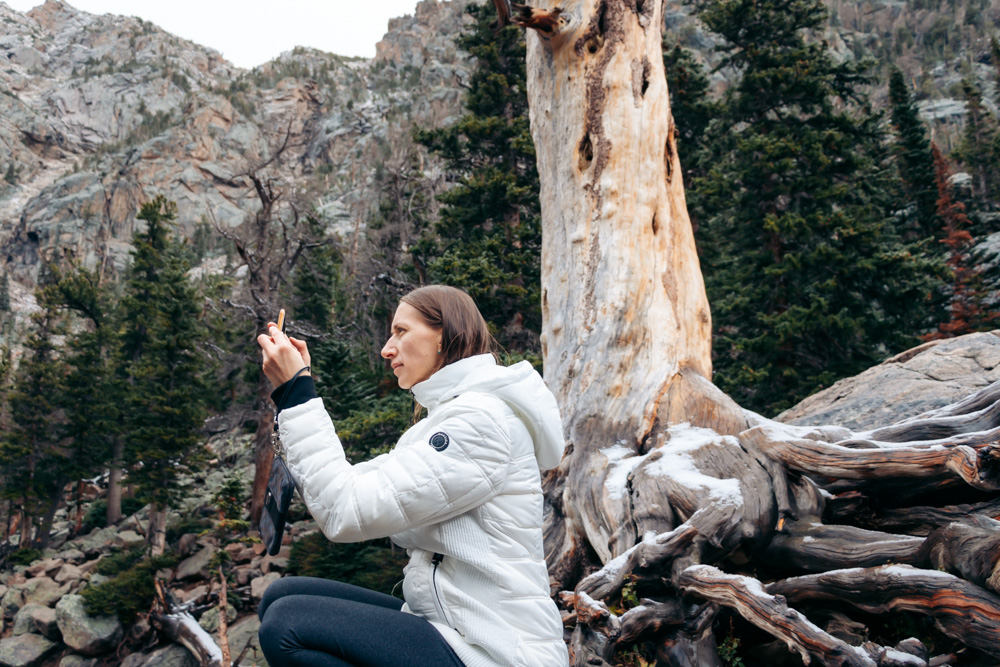
What to Pack
- Layers. It can get pretty cold hiking in Rocky Mountain National Park in fall.
- Raincoat. Keep yourself warm and dry as it rains a lot in the mountains during the fall season.
- Hiking Poles. These are of most help on the steep inclines.
- Snowshoes. If you spend 2 days in Rocky Mountain National Park in late fall, be sure to bring along the snowshoes. The trails may be covered with snow by this time.
- Snacks and Water. Never go hiking without a bottle of water and some snacks or light lunch.
- Skin Protection. Even in fall, the sun may shine brightly. Protect your skin by wearing sunglasses, a hat, and sunscreen.
- Protection for Your Camera. If you use only a phone to capture all the places and special moments you hope to experience in the next 2 days in the fall-reigned wilderness of Rocky Mountain National Park, skip this tip. For those who use cameras, bring some sort of protection from the rain, snow, and hail. It can be as simple as a ziploc or any other plastic bag.